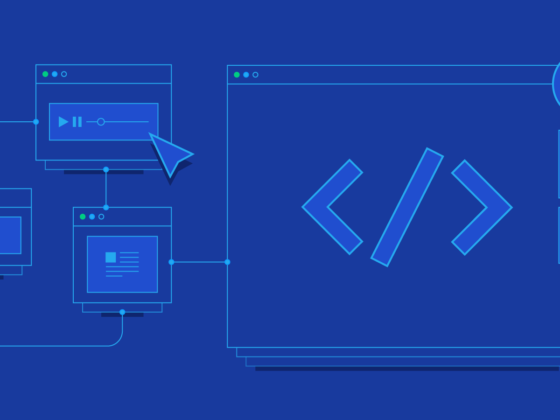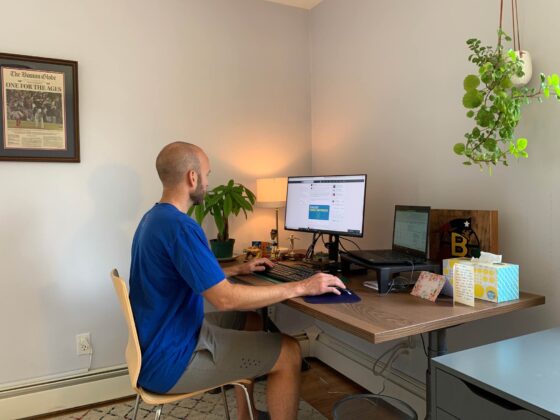Game developers are responsible for writing software code that translates artistic concepts into playable game features, which then work on mobile phones, computers, and console systems. Those interested in knowing how to become a game developer should also know that it’s quite a competitive industry, and standing out with a unique set of skills and solid knowledge is key to succeed here.
There are so many trends happening in the gaming industry, and perhaps one of the most notable ones is the benefits that Artificial Intelligence (AI) delivers in the process of game development. For instance, game developers can use AI to experiment with things like creating games that automatically evolve based on player feedback. Here, an AI algorithm can respond to a player’s choices to automatically develop new challenges, characters, worlds, and elements in a game, with the purpose of creating new levels and challenges for the players to explore.
Another popular trend in the world of gaming is Virtual Reality (VR), which is quickly rising in popularity across different industries as well. What VR games do is immerse players in different worlds created by software.
If you’re keen on becoming a game developer, such trends in the industry mean that a solid knowledge in software development must first be acquired, along with further studies in subjects associated with game development, coupled with a portfolio, some hands-on experience, and networking opportunities that will later prove beneficial as you begin applying for jobs.
Who is a game developer?
A game developer’s primary responsibility involves administering the developmental process of a video game. They design games or use the designs of games already in place and write the code that’s responsible for the game environments, characters, etc. Things like game levels and how the players advance through these levels are also aspects that a game developer is responsible for.
Working either as independent developers or in small/large game studios, some of the titles associated with the role of a game developer include 3D Artist, Game Designer, C/C++ Programmer, and Game Programmer. On average, game developers can expect to earn $92,061 in the U.S.
Why become a game developer
Prior to jumping into the steps on how to become a game developer, please consider that careers in the gaming industry are quite competitive. This competitive nature of the gaming industry makes it even more appealing for prospective game developers, who will want to prove themselves in the field. Not only is it financially rewarding to become a game developer, but the work involved is also fun.
Anyone entering game development is likely to have an immense passion for the field. They enter the niche with dedication and creativity, having a great sense of satisfaction once they create a final product that others will enjoy. If you’re passionate about gaming and have a keen drive to learn game development, then it’s probably for you.
4 steps to become a game developer
While there’s no quick and certain route you can take to establish your career in game development, there are a few steps you can take towards achieving your goal.
- Education: A solid educational background in Computer Science/IT is a start. A university/college accredited degree in the field or enrolling in a coding bootcamp that effectively prepares its students for a career in game development will set the foundation for your career. This is crucial for employers as they want to ensure that their candidates have a strong foundation in the field.
- Add to your skill set by learning coding languages: A degree in Computer Science/IT or low-level programming doesn’t guarantee your success in entering the world of game development. You must also keep adding to your skill set, by further enhancing your knowledge of the two most widely-used languages of game development: C++ and Java. Knowing more code languages, such as Assembly, Python, Perl, Lua, and C, is also integral to your success as a game developer. There are many options to learn coding languages, which we’ll cover in the next section of the article.
- Gain hands-on experience to build your portfolio: After you’ve gained all the knowledge required to succeed, it’s time to step foot into the real world of game development. You can start by applying for different internship programs where studios offer internship positions for aspiring game developers. Here is your chance to dive deep into the field, adding projects to your portfolio and enhancing your skills before you make a move to the job market. Networking is also critical to advancing in the gaming field.
- Apply for jobs: After you’ve gained some practical hands-on experience through an internship program, etc., and after you’ve worked on enough projects that’ll help you build a strong portfolio, you can start searching for jobs. Take this step up a notch by making employment contacts through Facebook and LinkedIn to stand out. This is a doable approach, and if you’re able to land some one-on-one meetings with contacts in the companies you’re eyeing, it’ll set you apart in this competitive field.
Where to learn game development
While there are a couple of great free online resources to learn game development, it takes a more in-depth learning approach to succeed.
Below are some programs/certificates and coding bootcamps that extensively cover subjects taught in game development:
- CG Spectrum: With streams in animation, 3D Modeling, Digital Painting, Game Development, and Visual Effects, CG Spectrum is an online animation, visual effects, and game development school.
Approximate cost: $3,000 to $7,800
Duration: 3-9 months
- FVI School of Technology: Based in Florida, this school offers a 9-month bootcamp that focuses on full-stack web development.
Approximate cost: N/A
Duration: N/A
- Northwestern Coding Bootcamp: Located in Chicago, IL, Northwestern Coding Bootcamp covers full-stack JavaScript, Python, and MongoDB.
Approximate cost: $10,000
Duration:12 weeks (full-time), 24 weeks (part-time)
- DigitalCrafts: Based in Atlanta, GA and Houston, TX, DigitalCrafts teaches Python in an intensive classroom setting.
Approximate cost: $13,950 (full-time), $9,500 (part-time)
Duration: 16 weeks (full-time), 24 weeks (part-time)
- Flatiron School: With course options available both online and in-person, Flatiron School teaches various programming languages.
Approximate cost: $16,900
Duration: 9-15 weeks
- Nucamp: Offering online, part-time, and self-paced learning formats, Nucamp’s coding bootcamp covers all the basics of coding, which are all applicable in the world of game development.
Approximate cost: $1,480 to $1,880
Duration: 17-22 weeks
Summary
The gaming market is rising in popularity, with an estimated value reaching USD 314.40 billion by 2027. In 2021 alone, the gaming market was valued at USD 173.70 billion, due to nationwide lockdowns that occurred in response to the COVID-19 pandemic, causing many people to turn to game platforms. The gaming industry’s upward trend is a great indicator of its potential, particularly to those wanting to know how to become a game developer.
There are continuous improvements and advancements in the technology behind gaming. For aspiring game developers, this reiterates the importance of being armed with the right knowledge, tools, and skill sets to succeed and stand out from all the competition.
First, you must identify your current level of knowledge in the field of Computer Science/IT. And if you feel like you lack the skills necessary to continue along the path, then it’s best to enroll in a certificate program or a coding bootcamp. Not only will it allow you to gain all the skills necessary to succeed in the field, but it’ll also help you build a portfolio that’s up-to-date with the current trends in the industry.
In the world of the game industry, there are so many trends driving its popularity. For instance, new business models are increasing, such as the free-to-play model and gaming as a service (GaaS). The free-to-play model allows gamers to play without any initial cost, where the games then introduce opportunities for monetization. This means that, for example, players can purchase credits to remove ads, interact with other gamers, or get unobstructed play. This is already a widely-used model across different games, whether on mobile or other gaming consoles. Moreover, GaaS, which also provides more monetization opportunities, allows gamers to expand a game’s lifespan over the long term.
Other trends, such as increased diversity in gaming, are also pushing the industry further towards an upwards trend. For instance, according to Gamify, 17% of men and 10% of women aged 18-35 play video games in the U.S. All this means that there will always be competition when it comes to hiring game developers, which is even more of a reason for those aspiring to become one to further push their limits.










